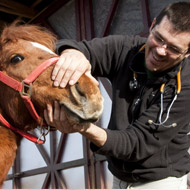Equine vets vote against corporatisation

"Whether we like it or not corporatisation of equine practices is on the rise" - BEVA president, John Chitty.
Seventy-two per cent of equine vets disagree with motion that corporatisation is inevitable and will benefit vets and clients, according to a debate at BEVA Congress.
The trend for the corporatisation of veterinary practices is growing; in the past two years, the UK’s biggest veterinary group CVS has acquired 32 equine practices. However, it remains a controversial process with strong views from both sides about the potential advantages or disadvantages to vets, their clients and their patients.
The debate saw Keith Chandler, former BEVA president and member of the acquisitions team at Independent Vet Care and Karl Holliman, partner and director at Cliffe Veterinary Group, arguing for corporatisation. Andrew Harrison, a partner at Three Counties Equine Hospital and Tim Greet, who recently retired as an equine partner at Rossdales, took the opposing side.
It opened with a fairly equal balance of views, with 44 per cent voting for corporatisation and 56 per cent against. An hour of candid discussion, however, served to reinforce the opposing side.
BEVA president Jon Pycock said: “Whether we like it or not corporatisation of equine practices is on the rise. But it shouldn’t mean that the future isn’t going to be viable for independents too as there is a role for both to co-exist. Importantly, this should mean that vets and their clients will both continue to have choices.”
The pro-corporatisation team advocated that commercial and business advantages, together with the scale and diversity of a corporate, can give vets greater potential for a more flexible career path and advancement within the industry, and a more sustainable working career in equine practice. Karl Holliman highlighted that corporates enable greater purchasing power, better health and safety resources, improved career structure and the freedom for employed vets to focus on clinical expertise.
The anti-corporatisation panel said that clinical rather than commercial elements drive practice and partners are light on their feet and can respond quickly to decision without referring to “a ponderous corporate hierarchy”. Tim Greet argued that clients like continuity and the quickest way to lose them would be to send in different vets. He added that a bespoke approach to client care was needed rather than hard targeting.
The session closed with a significant majority of 72 per cent of the audience disagreeing with the motion ‘Corporatisation is inevitable and will benefit vets and their clients’.



 The veterinary mental health charity Vetlife is inviting the veterinary community to join it for a sponsored cold-water dip.
The veterinary mental health charity Vetlife is inviting the veterinary community to join it for a sponsored cold-water dip.